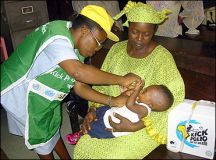UN launches massive polio vaccination campaign across Africa
By SAM CAGE, Associated Press Writer
GENEVA, Oct 08, 2004 (AP) — The United Nations launched a massive polio immunization campaign across Africa on Friday, aiming to undo the region-wide effects of a vaccine boycott in Nigeria, the global body’s health agency said.

|
|
A health official administers a polio vaccine to a child at Lagos City Hall Health Centre |
More than a million aid workers plan to immunize 80 million children in 23 countries of sub-Saharan Africa, said Dr. David Heymann, who is overseeing the World Health Organization’s effort to eradicate polio.
“Africa was almost polio free at this time last year,” Heymann noted.
However, a vaccination boycott in Nigeria — Africa’s most populous nation — spawned a resurgence of the crippling virus across Africa, infecting children in formerly polio-free countries and threatening efforts to wipe out polio by 2005.
“This is a tragedy because these countries were polio free, except two,” said Heymann, referring to Nigeria and Niger.
Extremist Islamic clerics had led the boycott, claiming the polio vaccine was part of a U.S.-led plot to render Nigeria’s Muslims infertile or infect them with AIDS. Vaccination programs restarted in Nigeria in July, after local officials ended their 11-month boycott, but the latest campaign is the first Africa-wide attempt to undo the damage.
Local and international health workers are now going door-to-door in an effort to immunize every child under age 5 across west and central Africa as well as war-ravaged Sudan.
There have been 786 confirmed cases of polio worldwide so far this year and the disease is now endemic in six countries: Afghanistan, Egypt, India, Niger, Nigeria and Pakistan.
Polio had previously been eradicated from all countries in the region except Nigeria and Niger, but 10 previously polio-free countries have now been re-infected. Immunization activities need to improve in Nigeria and Niger if polio is to be stopped in Africa by the end of next year, WHO said.
“The resurgence of polio in Africa proves that when immunization fails, polio will spread in these communities,” said Rima Salah, a senior official from UNICEF, the U.N. children’s agency.
The immunization effort was given a political boost last week, when Nigeria’s President Olusegun Obasanjo led other regional representatives in giving dozens of children oral vaccine drops in the mainly Muslim northern state of Kano.
The campaign is being coordinated by the Global Polio Eradication Initiative, which includes U.N. health agencies, the U.S. Centers for Disease Control and Rotary International.
“If the campaigns reach enough children in the region’s hotspots, polio transmission can be expected to slow significantly by the end of this year,” WHO said. “In some countries where the virus has a weaker foothold, transmission could stop completely by early 2005, epidemiologists predict.”
WHO said there are severe logistical problems to be overcome, particularly because of civil unrest in parts of Ivory Coast, Liberia and Sudan.
“The recent spread of polio in the Darfur region of Sudan and spread to Khartoum underscores the speed with which the virus can re-infect communities, particularly those which are displaced and isolated by conflict,” the agency said.
